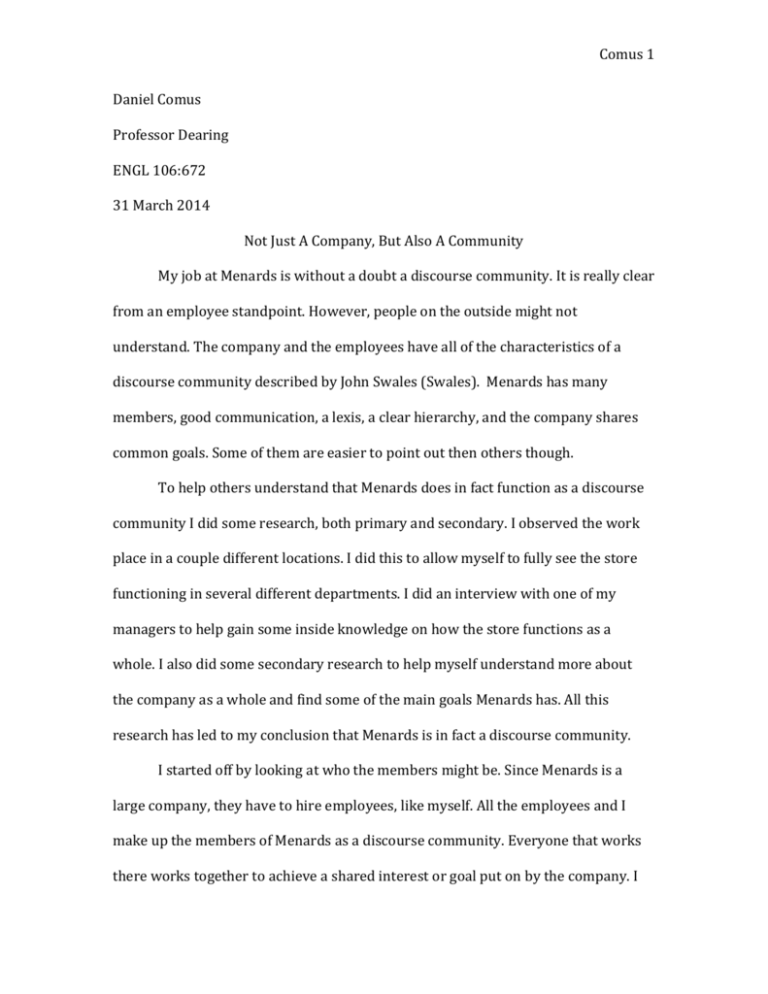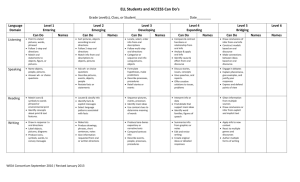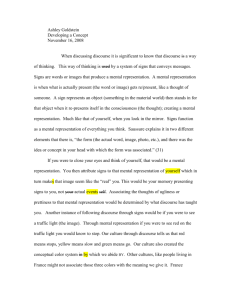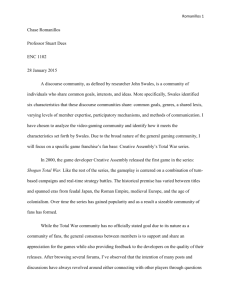Ethnography
advertisement

Comus 1 Daniel Comus Professor Dearing ENGL 106:672 31 March 2014 Not Just A Company, But Also A Community My job at Menards is without a doubt a discourse community. It is really clear from an employee standpoint. However, people on the outside might not understand. The company and the employees have all of the characteristics of a discourse community described by John Swales (Swales). Menards has many members, good communication, a lexis, a clear hierarchy, and the company shares common goals. Some of them are easier to point out then others though. To help others understand that Menards does in fact function as a discourse community I did some research, both primary and secondary. I observed the work place in a couple different locations. I did this to allow myself to fully see the store functioning in several different departments. I did an interview with one of my managers to help gain some inside knowledge on how the store functions as a whole. I also did some secondary research to help myself understand more about the company as a whole and find some of the main goals Menards has. All this research has led to my conclusion that Menards is in fact a discourse community. I started off by looking at who the members might be. Since Menards is a large company, they have to hire employees, like myself. All the employees and I make up the members of Menards as a discourse community. Everyone that works there works together to achieve a shared interest or goal put on by the company. I Comus 2 have witnessed this happening through one of my observations (Hardware Department). Without members, Menards would not be able to properly function as a discourse community or as a company. There is definitely communication throughout the store and the company. The company sends out emails to each individual Menards explaining things they need to change and switch in each store. After interviewing the floor coverings manager, I better understood how the communication works from the corporate offices to the store (Floor Coverings Manager). This is how the company communicates and shares similarities as well. Inside the store, there is face-to-face communication from the store manager to the department managers and on down the chain of command as well. The store manager is in charge of the entire store, so he makes all the decision that corporate allows him too. I observed him communicating with some of the team members and informing them on tasks that needed completed throughout the day (Hardware Department). The communication in the store is very good and contributes to the overall store and company’s conformity and success. Going along with communication, there is a lexis used at Menards as well. As an employee there are terms I use that people on the outside most likely would not understand. In the store we use acronyms and words to make it easier to organize and locate things. One of the acronyms used a lot is POG, or Plan-O-Gram. A POG is an organization sheet for a shelf. The company sends out a paper with a picture of what the shelf should look like and it has locations for each item supposed to be on that shelf (Floor Coverings Manager). Another term that non-members might not Comus 3 understand would be mega rack. At the store I work at, we call the large shelves holding up the merchandise, mega rack. The mega rack however, is different than just a normal shelf; they are the tall shelves that have overstock product located on the very top of them. The carts at Menards might also be considered in the lexis. The shopping carts are called basket carts, the flat bed carts with one handle are called flat carts, the carts with four rails over them are rail carts and the blue carts with a v cutout are called carpet carts (Front End Department). Different people might call these carts different things, but through out the store they are labeled as such to make things easy to understand. There is a fairly large lexis at Menards; these are just a couple of the main terms used everyday. Menards also contains a very clear hierarchy. Just like almost every company out there, there are employees, assistant manager, managers, etc. At Menards I started out as an employee, then, above me are assistant managers, department managers, assistant general managers and general managers. The general managers are in charge of the entire store and monitor everything. The department managers are only in charge of one department in the store and get their tasks from the corporate offices or from one of the general managers. From there, they pass it on to their assistants and their employees so they know what needs done each day (Floor Coverings Manager). There is a very clear hierarchy at Menards that is very similar to most other companies out there. Being a large and successful company, Menards definitely has shared goals from store to store. The goals shape the company to hat it is today and help it function as a discourse. Menards is dedicated at providing high quality guest service Comus 4 and providing great service and quality with its products (Menards). Each individual member shares these goals, and they are passed down through the chain of command in the store. These goals give me a reason to be there and allow me to share common interests with my coworkers. I observed the employees working towards these goals in all of my observations at the store (Front End Department). I noticed this in all my observations because it happens non-stop at the store. Since these are the main goals stated my Menards, myself and my coworkers have to be constantly working towards them. There are also smaller goals given each day, like sales goals and things that need to get done each day. These goals are given through email by either the general manager, or by the employees in the corporate offices (Floor Coverings Manager). These goals aren’t usually as noticeable as the main goals, but are just as important. The small tasks sent out by corporate are usually designed to affect and contribute to the main goals of the company. My job at Menards has all the characteristics of a discourse described by Swales. All of these characteristics contribute to its function as an individual store, and as an entire company. Without these characteristics, Menards would not be around today. Menards may not have intended to become a discourse on purpose, but it functions very well as a discourse community. Comus 5 Mega Rack Menards Company Goals Comus 6






